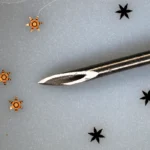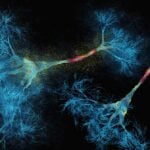New Aging Award Will Help Better Classify Aging Predictors

Jude Phillip, assistant professor in the Biomedical Engineering Department and Institute for NanoBioTechnology core researcher, has received a Catalyst award in the Healthy Longevity Global Competition from the National Academy of Sciences, which includes National Academy of Engineering and National Academy of Medicine.
The award will help Phillip lead a research team to develop standard measurements for frailty and resilience, two known factors that help predict disease onset and recovery. Generally, as people age, they become more at risk of developing physical and cognitive diseases. But when these diseases develop, and how people recover from them, is not the same from person-to-person. To better classify and measure resilience (the ability of a person to regain baseline physiology and health after injury or surgery), Phillip and his team will stress T cells, a type of immune cell, and see how they recover. Their results can lead to improved developments in precision aging strategies, which will guide interventions and shape treatment options so people can live longer, healthier lives and reduce treatment costs.
Co-investigators with Phillip are Jeremy Walston, the Raymond and Anna Lublin Professor of Geriatric Medicine & Gerontology at the Johns Hopkins School of Medicine and INBT associate researcher and Sean Sun, Professor in the Department of Mechanical Engineering and INBT core research.
“I’m thrilled to collaborate with Jeremy Walston and Sean Sun on this project as they are amazing researchers. The whole team is excited that this award will support what we think is an innovative idea in aging research related to resilience. At Hopkins, we are re-engineering the future of health, and aging is central to this,” said Phillip.
The competition has three phases: Catalyst, Accelerator, and Grand Prize. The Catalyst phase rewards bold, innovative ideas that have the potential to extend the human healthspan through disease prevention, mobility, functionality, social connectedness, longevity, and more. The team hopes to eventually apply to the Accelerator competition.
Latest Posts
-
 Johns Hopkins Postdoc Named in Forbes `30 Under 30′ List
December 8, 2025
Johns Hopkins Postdoc Named in Forbes `30 Under 30′ List
December 8, 2025
-
 Micro Grippers: David Gracias Builds Micromachines That Fold, Stick, Swim, and Sense—All Inside the Human Body.
November 20, 2025
Micro Grippers: David Gracias Builds Micromachines That Fold, Stick, Swim, and Sense—All Inside the Human Body.
November 20, 2025
-
 A bold new approach to autoimmune diseases
November 19, 2025
A bold new approach to autoimmune diseases
November 19, 2025


